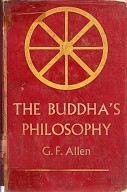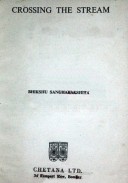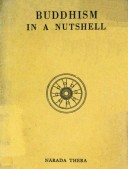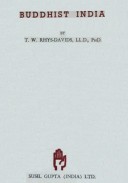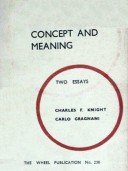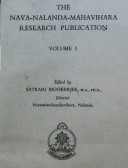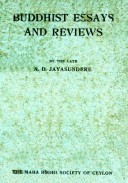Tìm Sách
Sách tiếng Anh-English >> The Buddha’s Philosophy
Thông tin tra cứu
- Tên sách : The Buddha’s Philosophy
- Tác giả : G.F. Allen
- Dịch giả :
- Ngôn ngữ : Anh
- Số trang : 194
- Nhà xuất bản : London – George Allen and Unwin Ltd.
- Năm xuất bản : 1959
- Phân loại : Sách tiếng Anh-English
- MCB : 12010000004781
- OPAC :
- Tóm tắt :
The Buddha’s Philosophy
Selection from the pãlicanon
And an introductory essay
G. F. ALLEN
(Y.Siri Nyana)
Ruskin house
George Allen And Unwin Ltd
Museum street London
PREFACE
A number of the most ancient available records of the teaching of Gotama the Buddha are found in the books of the Pãli Canon of the Southern school of Buddhism. It is generally accepted that the majority of the earliest Pãli text are as old, if not older, than the Sanskrit works from which many of the Chinese and Tibetan Buddhist scriptures of the Northern School were translated. In this study we go to the Pãli sources. And it is from them that the Buddhist scriptural quotations which are given in our book are made.
Some of the ancient Pãli epithets find no equvalent in any specific English words, when a sentence is required to define them; while occasionally the Indian metaphysical concepts themselves are absent from Western thought. For these reasons it has been deemed advisable to retain in our text a few of the fundamental Pãli terms. Difinitions of these words are included in the Glossary on pages 19 and 20.
Where it is necessary to give Pãli words in the plural number this is done by the addition of the English ‘s’, since in the Pãli language there is more than one plural suffix.
CONTENTS
Foreword
Preface
Glossary
PART ONE: INTRODUCTION BUDDHA AND DHAMMA
Introductory
The Ãryans
The Brãhmans
Brahma –God
Gotama Buddha
Nibbãna, the goal
Anicca , change
Kamma and Rebirth
Dukkha , sorrow
The four truths
The eightfold path
The causal formula
The five khandhas
An-attã, not self
The three characteristics
Buddhist mental culture
Sublime states of mind
Jhãna, contemplation
Satipatthãna, awareness
The muni
Silence
Truth as a refuge
Equanimity
Peace here and now
The Pãli Canon
The Pãli language
Chronology of Pãli literature
The Pristine, Ascetic stage
The Sutta Nipãta
The Buddhist councils
The Monastic, Seetarian stage
The Vinaya Pitaka
The four Ãgamas
The Moralistic, religious stage
The legends
Commentarial literature
Other evidence for Chronology
Table of dates
PART TWO: THE TEACHING: DHAMMA AND DISCIPLINE
The Buddha’s first discourse
The second discourse
The Sutta Nipãta (early portions)
The Buddha’s code of mere morality
The primitive Pãtimokkha
The Pãtimokkha rules (for Monks)
Sikkhãpadas (novices’ abstentions)
The five precepts (for lay Buddhists)
Extract from the Brahmajãla Sutta
The Buddha’s last words
Saddhamma (essential and specific items of Buddhist doctrine)
Appendex A
Buddha yoga, Buddhist mental culture
Brahma Vihãras: sublime states of mind
Satipattthãna: application of mindfulness
Jhãna: absorption
Subjects for contemplation
Appendix B The Pãli alphabet
Appendix C Pãli commentarial literature
Appendix D Index of Suttas, etc
Bibliography
Index
List of abbreviations
ILLUSTRATIVE
Plate Amarãvati Panel
Map I early Ãryan migrations
Map IIÃryan migration in Bhãratavarsha
Chart A. The philosophical schools of India
Map III. The Ãryan kingdoms and states
Map IV.The middle country
Map V.Distribution of the Indian Buddhist sects
Map VI. The spread of Buddhism beyond India
Chart B. The Pãli canon
Chart C. Chronolgy of the Pãli canon
Chart D. Stages in the development of Buddhism
Chart E. The wheel
 Facebook
Facebook
 Google
Google
 Google+
Google+
